Andrew Haigh 45 Years Interview
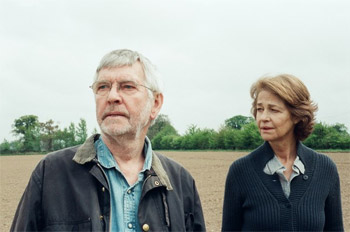
Andrew Haigh 45 Years Interview
Cast: Charlotte Rampling, Tom Courtenay, Geraldine James
Director: Andrew Haigh
Genre: Drama
Rated: M
Running Time: 95 minutes
Synopsis: Kate Mercer is planning a party to celebrate her 45th wedding anniversary. One week before the celebration a letter arrives for her husband, Geoff, containing news that the body of his first love has been discovered, frozen and preserved in the icy glaciers of the Swiss Alps.
Kate continues to prepare for the party, but she becomes increasingly concerned by Geoff's preoccupation with the letter and the startling revelations about his former life. As their anniversary gets closer, and they delve further into the past, their future is left in question.
Anchored by sensational performances from Charlotte Rampling and Tom Courtenay, 45 YEARS is an intimate, moving and beautiful portrait of a marriage shaken to its core by things left unspoken. Winning Best Actor and Best Actress awards at the 2015 Berlinale Film Festival, 45 Years is British filmmaking at its very best.
45 Years
Release Date: February 18th, 2016
About The Production
45 Years presents a new take on relationships, old age, forgiveness and jealousy, from a writer/ director with a unique insight into relationships. It also presents two performances from treasured stars of British cinema, Charlotte Rampling and Tom Courtenay. Andrew Haigh's screenplay is adapted from David Constantine's short story In Another Country.
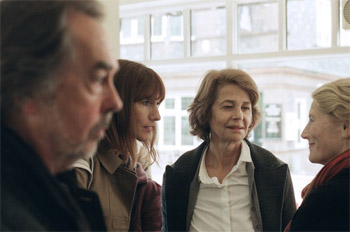 In the sphere of romantic love, longevity tends to be praised as an achievement in itself. Cheery news items circulate periodically about unions that have endured over many decades, and attract gushing comments about how sweet, how adorable, how inspiring it is for love to last so long. But did these happy couples make a better choice to begin with, or love better all along, than those who part sooner? Could it be, rather, that they buried their issues deeper; or were fortunate or skilful in dodging the emotional landmines that can unexpectedly explode the strongest-seeming bond? Does intimacy inevitably increase as the years wear on – or might it suddenly rupture, or slowly erode?
In the sphere of romantic love, longevity tends to be praised as an achievement in itself. Cheery news items circulate periodically about unions that have endured over many decades, and attract gushing comments about how sweet, how adorable, how inspiring it is for love to last so long. But did these happy couples make a better choice to begin with, or love better all along, than those who part sooner? Could it be, rather, that they buried their issues deeper; or were fortunate or skilful in dodging the emotional landmines that can unexpectedly explode the strongest-seeming bond? Does intimacy inevitably increase as the years wear on – or might it suddenly rupture, or slowly erode?
The couple at the centre of 45 Years are not yet in decrepitude, adorable or otherwise. Kate and Geoff Mercer remain intellectually vital and - Geoff's recent heart bypass apart – physically well. But having married as young as was customary in the 60s, when they met, they have already been together longer than many couples of a younger, more commitment-averse generation ever will. Theirs seems a sturdy union. But Haigh's film captures, with haunting acuity, just how vulnerable their marriage becomes when past pain surfaces and past jealousy is reawakened.
If Haigh's previous feature film, 2001's highly-acclaimed Weekend, depicted a barely begun relationship that may or may not go on to flourish beyond the titular two-day span, this follow-up feature takes the opposite narrative tack. The concerns of 45 Years, however, are unexpectedly similar to those of Haigh's memorable breakout film. How does trust establish itself, and love express itself? How close can we get to another, and how much should we expect to always operate alone?
In many ways, Kate and Geoff are as one. She knows what books he's started and not finished; he's forever engaged in trying to fix their broken toilet; gossip about friends and local people is referenced between them in easy verbal shorthand. But a macabre reminder of Geoff's life before Kate – the discovery of the body of his previous girlfriend, Katya, killed in a walking accident in Switzerland fifty years before – makes him seem suddenly a stranger to his wife, and emphasises remorselessly the emotional differences between them. 'A fissure, I suppose you'd call it – like a narrow crack in the rock," says Geoff of the fault that claimed Katya's life, little suspecting that he's naming exactly what's happening to his marriage in the moment. Geoff, a tactless, too-open naif who, as Kate puts it, 'gets over-passionate about things", will continue to blunder over the feelings of his contained but sensitive wife, confounding the truism that honesty is the best policy. Kate, meanwhile, will marinate in the most hopeless sort of jealousy: the sort that refers to people and relationships long since gone. 'I can hardly be cross with something that happened before we existed, can I?" she reasonably states. But she is… and the full range of reasons that she is will soon be discreetly unveiled, to the viewer if not to Geoff.
Films about older age that don't sentimentalise, or patronise are few and far between. 45 Years treats its characters as people still in the thick of life and still vulnerable to its emotional slings and arrows. Piquancy is added with the casting of two erstwhile icons of British youth culture, Charlotte Rampling and Tom Courtenay, in the roles. When Geoff tells Kate, 'You were a bloody knockout", we can picture Rampling as the Swinging London model and starlet who became known as -The Look'; and when she rejoins, 'You were so cool," we see Courtenay as the scrawnily handsome ne'er-do-well of The Loneliness of the Long Distance Runner and Billy Liar. Meanwhile, the 60s pop music that seems to be stalking Kate as she grapples with her husband's undead past – I Only Want To Be With You; Young Girl; Happy Together – cruelly contrasts the wideeyed fantasies of youth with the testing realities of making love last.
Compassionate, sharply observed and subtly funny, 45 Years looks in-depth at a phase of life often minimised, caricatured or excluded altogether from film narratives, and at a side of love – retrospective jealousy – as hard to talk about as it is to endure. It also offers two of our finest performers their best roles in years, and confirms Haigh – most recently feted for the HBO television drama series Looking – as a writer/director of uncommon insight.
The film also marks an evolution in the work of its dynamic British production company, The Bureau. Having established itself as an exciting launchpad for bold directors at the start of their career – Asif Kapadia, Alexis Dos Santos and Andrew Haigh among them – the company is now building its profile through ongoing relationships with those directors, new associations with other directors-to-watch, and higher-profile films with prime roles for established stars. Most recently the company worked with Alan Rickman on his directorial project A Little Chaos (2014), starring Kate Winslet.
Interview with Andrew Haigh
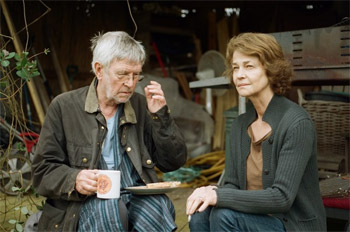 Question: What appealed about the short story and how did you go about the process of adapting it?
Question: What appealed about the short story and how did you go about the process of adapting it?
Andrew Haigh: There was something heart-breaking to me about the story of a relationship faltering at its final hurdle. It was as if this reminder of the past, this preserved body in the ice, had been waiting for its moment to throw everything into chaos, into a very quiet internal chaos. Through the cracks in the earth come all of those doubts and fears, all of those things unsaid over the years, emotions repressed and kept hidden. It's as if Kate and Geoff's whole relationship, from the foundation up, is suddenly called into question by a woman who no longer exists.
The original short story was beautifully clear and concise but for the adaptation it needed some expansion. Apart from adding the anniversary party, the biggest change was to lower characters' ages from mid-80s to late 60/early 70s. The original time frame meant the story was set in the 1990s and the backstory was during the Second World War. I wanted the story of Kate and Geoff to feel very present-tense. I didn't want it to be about the choices of an older generation now gone, but a story about the choices we all have to make. I also decided to tell the story solely from Kate's perspective, which was different from the original story. There are many films and works of fiction that deal with the male existential crisis and I wanted to take a different perspective on the story.
Question: Can you say something about the relationship between this film and Weekend?
Andrew Haigh: There is certainly a correlation between the two. Both films are interested in the complexities of intimacy between two people; the risks involved in exposing yourself emotionally to someone else; the difficulty of being truly honest about your fears. I am very interested in how our romantic relationships speak a bigger truth about who we are and how we want the world to see us.
Question: The inability to communicate emotionally sensitive things is often regarded as particularly British – do you think there's anything in that, especially since you've been working in the States?
Andrew Haigh: I do think there is something culturally and politically conservative about the British which encourages many to bury their feelings for the sake of keeping the status quo. This is certainly the case with the English middle classes. Saying that, I think it's very hard for anyone to be truly open about their feelings because for most of the time they make no sense to us. We can experience them but it is hard for us to articulate what they are. It is also a risk - sharing you inner most feelings is always going to feel like a risk.
Question: What did Charlotte bring to the role, and what is special to you about her as an actress?
Andrew Haigh: Charlotte is a fiercely intelligent actress. She knows what feels truthful and what does not. When I watch her on screen I see a hurricane of emotion under the surface, behind those eyes. You are invited to observe but also warned to keep your distance. That feels incredibly true to me. They are things all of us should keep to ourselves.
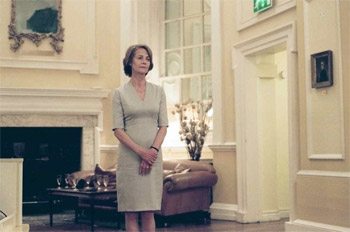
Question: And Tom Courtenay?
Andrew Haigh: There is vulnerability to Tom and to his performance. The last thing I wanted for this film was an angry man raging at the world; I've seen that on screen too many times before. I wanted something more complex, something more sensitive. Here is a character struggling with his own sense of self, not the villain of the piece. Hopefully in 45 Years there are no villains, just people trying to figure things out.
Question: Their histories as 60s icons haunted their performances, with the snatches of 60s pop music serving as little reminders. Was that something you wanted the audience to pick up on?
Andrew Haigh: I always hoped that their histories would be felt in small, subtle ways. The film is partly about the hopefulness of the past, the potential of our younger selves and knowing these actors as younger people helped enormously. There is a certain melancholy to that and I'm very interested in that as a feeling. I often think that the melancholy we feel about the past is more about the failures and disappointments of the present than the past itself.
Question: There is something about their onscreen relationship that feels very real but at the same time quite unconventional for a portrayal of older people. They seem to be still in the midst of developing as people. Do you have a sense of how much of that was in the script, how much came through as you filmed and how much was from the performances?
Andrew Haigh: This was certainly an intention. I don't believe people stop looking for the answers simply because they get older. There is this belief that by the time we get to our 30s we should have figured everything out, worked out who we are. I'm pretty sure for most of us life does not work like that. We are constantly changing, our identities always evolving and so always asking questions. If we are not, then we should be.
Question: What is your perspective on the rationality or otherwise of Kate's feelings of jealousy and rejection?
Andrew Haigh: I feel great sympathy for Kate. There is certainly an irrational nature to her feelings, which I think she is aware of, but at the sa
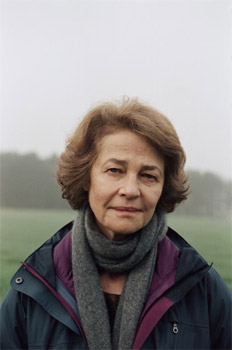 me time they speak to something deeper and more disconcerting. It's as if focusing on their relationship has forced a nausea that Kate cannot overcome. It is about feeling rejected and jealous but it's also about the very meaning of her life. It is as if under the weight of inspection all that she has built over the years has started to lose its meaning. It has fallen apart and she is not sure that she knows how to piece back together again.
me time they speak to something deeper and more disconcerting. It's as if focusing on their relationship has forced a nausea that Kate cannot overcome. It is about feeling rejected and jealous but it's also about the very meaning of her life. It is as if under the weight of inspection all that she has built over the years has started to lose its meaning. It has fallen apart and she is not sure that she knows how to piece back together again. Question: The references to nature add a really poetic layer – the earth concealing secrets, things that have become invisible but not gone away… is there anything you want to add about that?
Andrew Haigh: I seems pretty clear to me that what happens in our past, what becomes buried under the surface always remains. And I don't mean just the big things, the dramatic events of our lives, I mean all the small mundane details that make up our existence. And we often ignore this, we try to live in the present but it's not easy; the attic gets fuller and fuller and if we're not careful the rafters can break and leave a very big mess all over the bedroom floor.
Question: The presentation of the film is very peaceful and quiet, despite the intensity of the feelings. Can you talk about some of those aesthetic decisions?
Andrew Haigh: It was very important to me that the film started quiet and remained that way. This is not about trauma rearing its head, it's about smaller things; choices and decisions, locked-away feelings and emotions, the things we cannot articulate. All of those fears and doubts that live in those tiny fissures and cracks. Sometimes I think our lives become about not trying to put too much pressure on those fault-lines, hoping the ground doesn't open up and swallow us whole.
45 Years
Release Date: February 18th, 2016
MORE
- Mission: Impossible Fallout
- Glenn Close The Wife
- Allison Chhorn Stanley's Mouth Interview
- Benicio Del Toro Sicario: Day of the Soldado
- Dame Judi Dench Tea With The Dames
- Sandra Bullock Ocean's 8
- Chris Pratt Jurassic World: Fallen Kingdom
- Claudia Sangiorgi Dalimore and Michelle Grace...
- Rachel McAdams Disobedience Interview
- Sebastián Lelio and Alessandro Nivola...
- Perri Cummings Trench Interview



